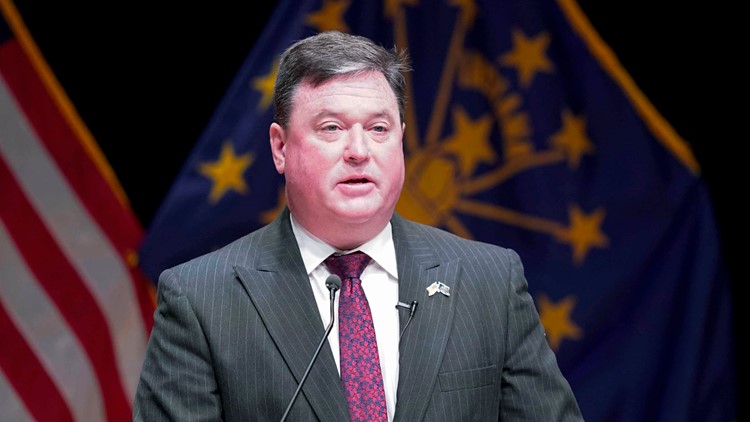INDIANAPOLIS — Indiana Attorney General Todd Rokita is calling Governor Eric Holcomb's attempt at suing the legislature unconstitutional. He went as far as filing a court brief that he says reiterates what the proper limits are to the governor's authority.
It's a tangled legal battle around a bill that would give the General Assembly authority to call for a special session to deal with a state of emergency. Currently, only the governor can convene a special session. The bill passed both chambers of the Legislature, but Gov. Holcomb vetoed it. Then, state lawmakers overrode the governor's veto. Thus, the bill became a law.
In response, Gov. Holcomb sued the state legislature. The lawsuit argues that the legislature is "usurping a power given exclusively to the governor" under the state constitution to call lawmakers into a special session.
This is when Attorney General Todd Rokita entered the legal battle.
Rokita was quick to ask the court to strike down the lawsuit insisting that his office should resolve the dispute between two branches of state government. Some legal experts have questioned legal arguments that Rokita has filed asking a judge to throw out the governor's lawsuit because state law gives him alone the authority to determine whether the governor can even go to court.
RELATED: Indiana AG moving to stop Gov. Holcomb's lawsuit against state Legislature over emergency powers law
Just last week, lawyers for Gov. Holcomb derided the attorney general's claim that he can block the governor from asking the courts to put an end to the new law. Holcomb's lawyers argued Rokita is making "absurd" arguments that he alone has the legal authority to represent the state in court and to decide whether the new law is constitutional.
Now, Rokita has dug his heels in.
The Attorney General's Office said Tuesday it had filed a 22-page court brief that cites Indiana Supreme Court precedents that say the governor may not — without the consent of the attorney general — call another branch of state government (in this case the state legislature) to account before a third branch of state government (the state courts).
Rokita argues the governor's Constitutional responsibility in regard to the new law ended with his veto. Now, Rokita says it's out of the governor's hands.
"The Governor already exercised his constitutional role in vetoing HEA 1123," the court brief says, "having been overridden by the General Assembly, he is not entitled to another veto via litigation. To confer such authority, this Court would have to invalidate, overturn, or ignore the original understanding of the Indiana Constitution, not to mention statutes and cases going back more than half a century."
He went on to insist it is his role to settle the dispute between the governor and the state legislature. He also clarified that it isn't his intent to take over the role of the judiciary.
"As both the Office of the Attorney General and the Indiana Supreme Court have long recognized, Indiana law vests the Attorney General with the authority and responsibility for setting a single legal policy on behalf of the State; Indiana courts, meanwhile, have authority to resolve concrete and justiciable legal disputes...
...The Attorney General therefore neither "seeks to usurp the role of the judiciary" nor claims "that he, and he alone, is to determine the constitutionality of HEA 1123"... If HEA 1123 imposes a concrete injury on a private party that challenges the statute's validity in a justiciable case, Indiana courts will resolve that dispute."
The brief argues the Governor's "unauthorized" lawsuit did not meet those tests.
The attorney general argues the real question isn't whether he is overstepping, it's whether the Governor is overstepping without his consent.
"The question here is instead whether the Governor—who in his official capacity is the State (or a part of it)—may, without the consent of the Attorney General, call another branch of the State to account before yet a third branch of the State."
The answer to this question, Rokita said, is no. He cited two Indiana Supreme Court decisions that he says recognize the attorney general's authority to resolve conflict between two branches of government.
What other people are reading:
- President Biden to host George Floyd's family at White House Tuesday to mark 1 year since his death
- Indianapolis man arrested after throwing gasoline, setting man on fire during argument
- Body of missing 12-year-old boy found in northwestern Indiana river
- Family of victims in Peru triple murder speaks out about inconceivable loss
- Car crashes through roof of Missouri home after going down embankment



